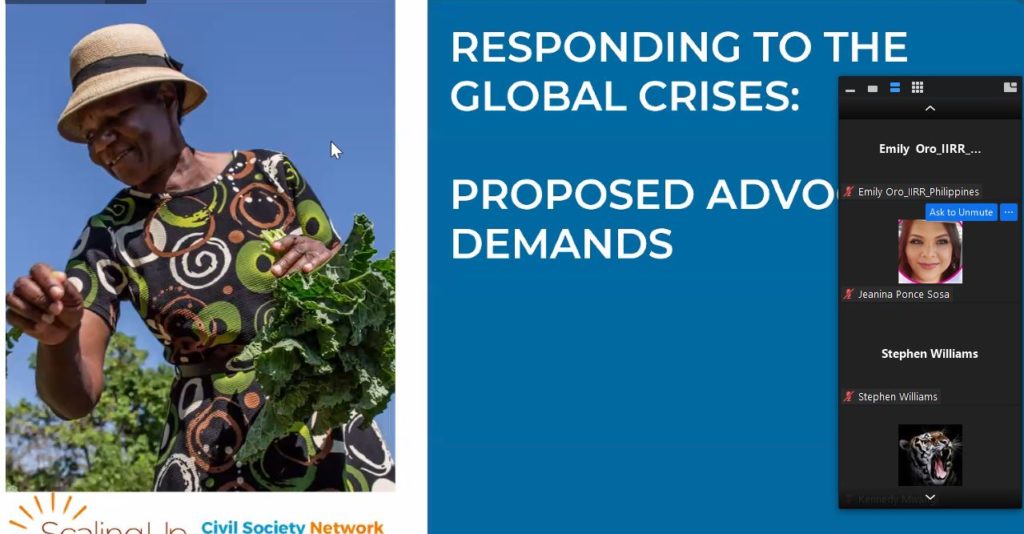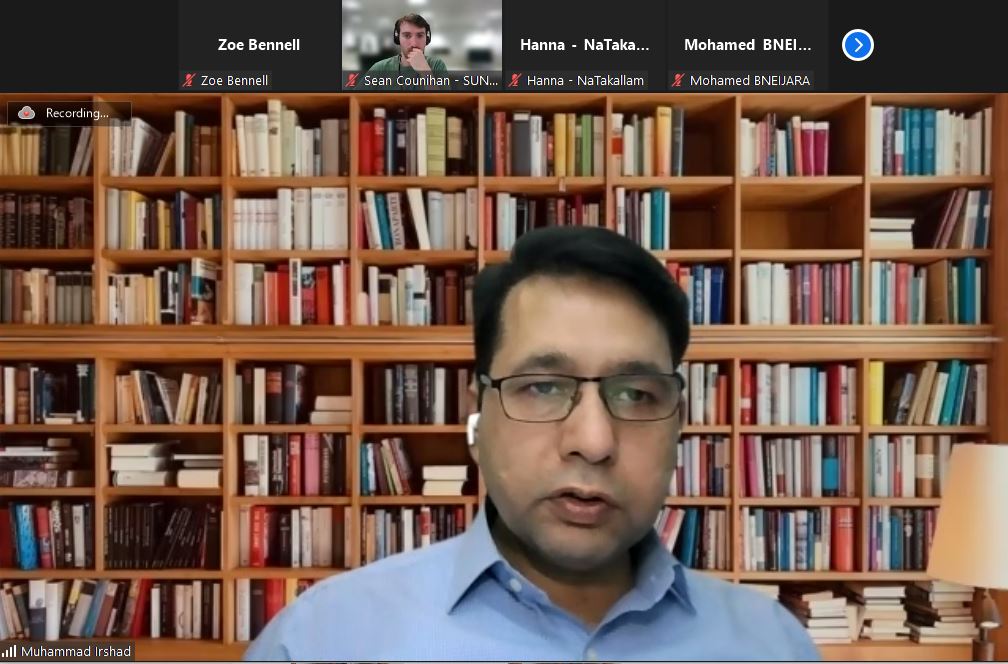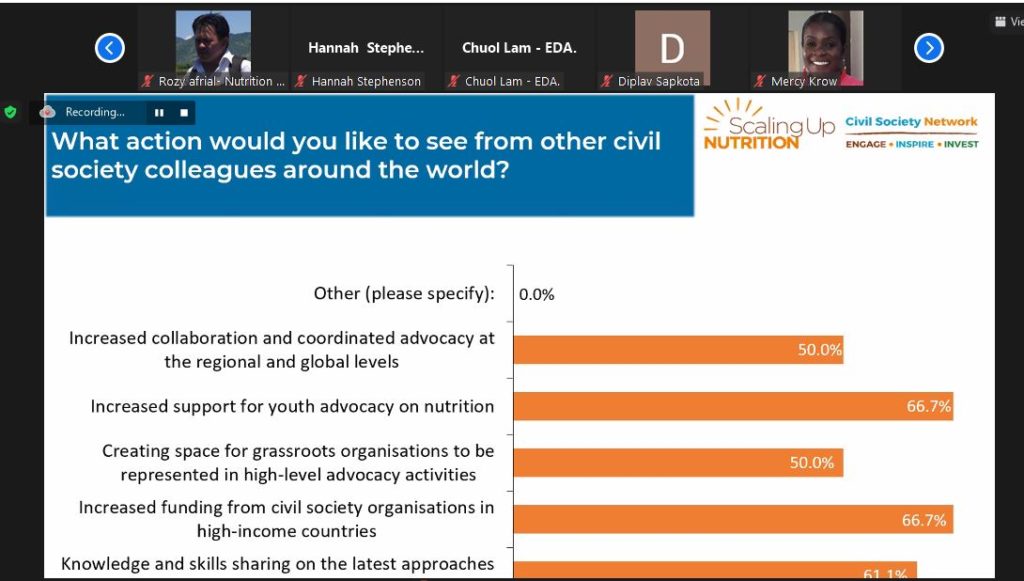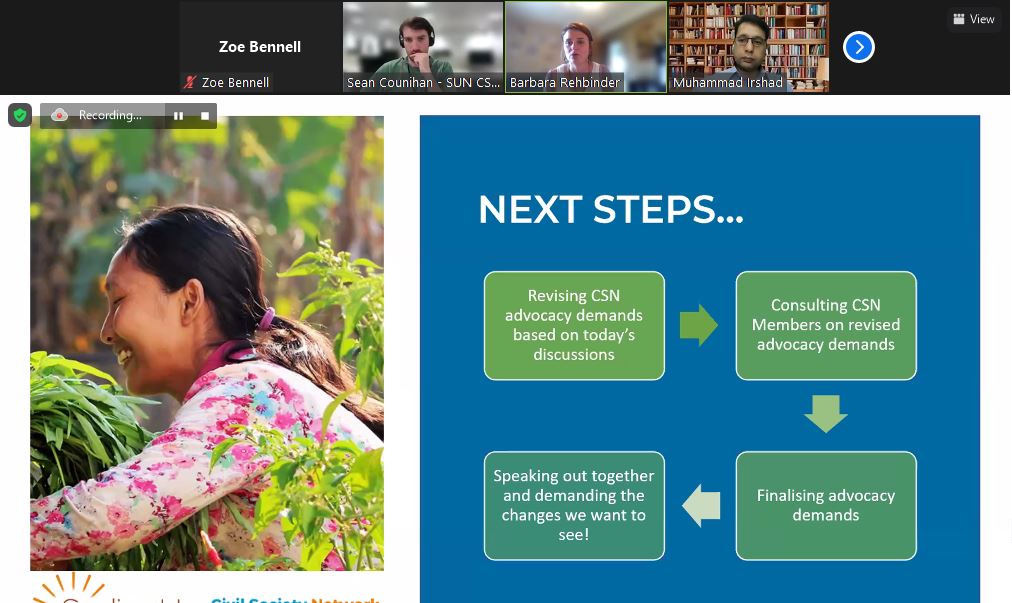This week saw over 60 members of the SUN Movement’s Civil Society Network (CSN) come together from countries all around the globe in the first ever network-wide assembly to discuss experiences and solutions surrounding the current global food crisis and to create tangible advocacy demands as a network. The discussion was full of ideas and stories from the ground, and demonstrated three key reminders about the civil society network.
- Civil Society cares
After dealing with the impact of the Covid-19 pandemic for the last two years, along with the ever growing impacts of the climate crisis, conflict in Ukraine has become a tipping point for members of the CSN. Many CSN member countries rely heavily on Russian and Ukrainian food imports and this disruption to global food systems has created food shortages and huge rises in food prices all over the world.
Before the assembly, members of the CSN inputted into a network-wide survey about the immediate barriers to nutrition they are seeing in their countries. Nearly all respondents agreed that there had been some level of impact on nutrition in their country and 94.4% stated that women and children were particularly affected. One CSN member stated that “the cost of food and fuel has increased, in several cases, beyond the reach of vulnerable communities.”
In the development of this assembly and throughout our survey responses, what was clear is how much our members care about the people they support and represent. Everyone wants to find a solution and continues to fight to improve nutrition, despite the difficulties of the present circumstances.


- Civil Society matters
During the assembly we saw a huge range of participants from all over the globe. We heard interventions in multiple languages from those affected in Afghanistan, Namibia, Ghana, Guatemala, Zimbabwe, Senegal, Madagascar and many, many more. They are all reporting difficult challenges for nutrition. As food becomes more scarce or more expensive, we are seeing nutrition being neglected, leading to a rise in Non-Communicable Diseases (NCDs), and in the rates of stunting, particularly in children. Lerato Radebe, from the Graca Michel Trust, reported that many schools in Africa closed during the Covid-19 pandemic, leading not only to a loss of education, but also of the one meal-a-day that children were guaranteed due to school meal programmes.
We also heard from colleagues who are facing ongoing humanitarian emergencies on top of global crises. Conflicts across the globe are also affecting the price and access to food, Zuhra, a programme manager for an organisation working in Afghanistan, reminded us that not all interventions work in contexts affected by ongoing conflicts. She urged the CSN community to include specific nutrition funding and interventions for fragile and conflict affected states in their policy and advocacy priorities.
What was clear throughout all of these conversations was the passion and dedication to the right to nutrition shared by our members. We heard time and time again of the incredible amount of work that members are already doing to deal with these ongoing crises, whether that be in policy and advocacy work or in programmatic delivery.


- Civil Society is propositional
All of these discussions were fed into a network-wide conversation on global advocacy demands which we focussed on in smaller breakout discussions. While we still have a way to go before we finalise these demands, there were many themes which we saw recurring. Discussions around universal basic income and the idea of similar social protection schemes not as grants but as human rights were universal. As was the idea that we need to advocate for debt relief, despite this being a huge and somewhat daunting prospect.
For the CSN’s global advocacy efforts to be effective, the priorities need to be owned and shaped by CSN members. Before, during, and after the assembly, members have engaged so thoughtfully with the proposed advocacy demands and challenged all of us to realistic policy aims with bold, ambitious thinking when it comes to fixing our broken global food system.
The story doesn’t end with this assembly, as we will continue the work together as a network to refine these advocacy demands until we can agree on a strong position on the biggest issues affecting the global food system and access to nutrition for all.
We hope that this assembly will be the first of many and that we see the CSN come together as a network much more frequently. The richness and the variety of the conversation reminds us that we have strength as a network and hearing the passion and the work of our members is a testimony to the importance of civil society. Look out for the global advocacy demands because, if we work together as a network, there’s no stopping us!

